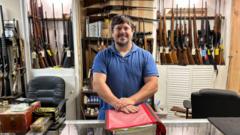In Kennesaw, Georgia, a small town encapsulating quintessential Southern charm—where baked biscuits scent the air and railroad trains rumble nearby—a peculiar law mandates firearm ownership among residents. Enacted in the 1980s, this regulation requires every head of household to maintain a firearm and accompanying ammunition.
"It's not like you go around wearing it on your hip like the Wild Wild West," states Derek Easterling, the town's mayor and a self-identified "retired Navy guy." The law doesn't call for door-to-door inspections; it emphasizes community protection and safety. Exemptions exist for those with disabilities, felony convictions, or contrary religious beliefs. Nevertheless, according to numerous officials, there have been no enforcement actions or penalties for non-compliance since the law's initiation in 1982.
Responses to the law are mixed among residents. Some express pride in Kennesaw’s embrace of gun culture, believing it deters crime. Local pizza patrons claim potential criminals think twice, knowing homeowners might be armed. Yet, in 2023, Kennesaw police reported no murders, although there were two gun-related suicides. Blake Weatherby, a local groundskeeper, argues that the community's attitude toward guns, rather than the guns themselves, fosters safety. He reflects on personal experiences growing up with a father who insisted that real men own guns.
On the other hand, long-serving city council member Pat Ferris describes the law as more symbolic than functional, a response to an earlier gun ban in Illinois. The ordinance gained notoriety, even gracing the cover of Penthouse Magazine. However, the law seems to have faded from public consciousness over the years—Ferris bemuses that many residents may not even be aware it exists.
James Rabun, who works at the family-owned Deercreek Gun Shop, views the law favorably, stating it helps sustain local business. The shop features various firearms, from historic models to modern-day handguns, reflecting a diverse passion for guns among residents. Cris Welsh, another Kennesaw mom and gun owner, admits to owning an impressive array of weapons but feels embarrassed by the law. She wishes Kennesaw were known more for its community values than its gun legislation.
As Kennesaw residents navigate their unique identity shaped by gun ownership laws, perspectives remain divided. Some embrace the legacy, while others seek to distance the town from the stigma of its legal requirement. Moving forward, the discussion around community and safety continues as Kennesaw reflects on its past in the age of evolving gun culture.
"It's not like you go around wearing it on your hip like the Wild Wild West," states Derek Easterling, the town's mayor and a self-identified "retired Navy guy." The law doesn't call for door-to-door inspections; it emphasizes community protection and safety. Exemptions exist for those with disabilities, felony convictions, or contrary religious beliefs. Nevertheless, according to numerous officials, there have been no enforcement actions or penalties for non-compliance since the law's initiation in 1982.
Responses to the law are mixed among residents. Some express pride in Kennesaw’s embrace of gun culture, believing it deters crime. Local pizza patrons claim potential criminals think twice, knowing homeowners might be armed. Yet, in 2023, Kennesaw police reported no murders, although there were two gun-related suicides. Blake Weatherby, a local groundskeeper, argues that the community's attitude toward guns, rather than the guns themselves, fosters safety. He reflects on personal experiences growing up with a father who insisted that real men own guns.
On the other hand, long-serving city council member Pat Ferris describes the law as more symbolic than functional, a response to an earlier gun ban in Illinois. The ordinance gained notoriety, even gracing the cover of Penthouse Magazine. However, the law seems to have faded from public consciousness over the years—Ferris bemuses that many residents may not even be aware it exists.
James Rabun, who works at the family-owned Deercreek Gun Shop, views the law favorably, stating it helps sustain local business. The shop features various firearms, from historic models to modern-day handguns, reflecting a diverse passion for guns among residents. Cris Welsh, another Kennesaw mom and gun owner, admits to owning an impressive array of weapons but feels embarrassed by the law. She wishes Kennesaw were known more for its community values than its gun legislation.
As Kennesaw residents navigate their unique identity shaped by gun ownership laws, perspectives remain divided. Some embrace the legacy, while others seek to distance the town from the stigma of its legal requirement. Moving forward, the discussion around community and safety continues as Kennesaw reflects on its past in the age of evolving gun culture.





















